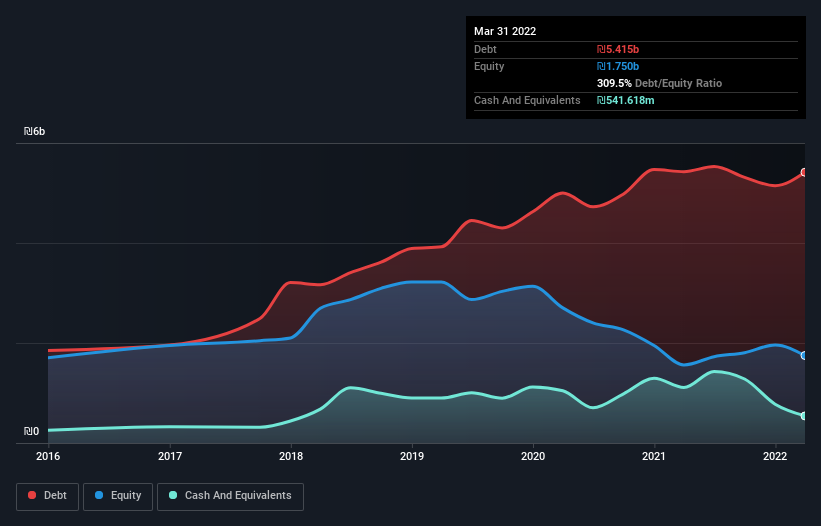Warren Buffett famously said, 'Volatility is far from synonymous with risk.' When we think about how risky a company is, we always like to look at its use of debt, since debt overload can lead to ruin. We can see that Fattal Holdings (1998) Ltd (TLV:FTAL) does use debt in its business. But the real question is whether this debt is making the company risky.
What Risk Does Debt Bring?
Debt and other liabilities become risky for a business when it cannot easily fulfill those obligations, either with free cash flow or by raising capital at an attractive price. In the worst case scenario, a company can go bankrupt if it cannot pay its creditors. While that is not too common, we often do see indebted companies permanently diluting shareholders because lenders force them to raise capital at a distressed price. Of course, debt can be an important tool in businesses, particularly capital heavy businesses. The first step when considering a company's debt levels is to consider its cash and debt together.
See our latest analysis for Fattal Holdings (1998)
What Is Fattal Holdings (1998)'s Debt?
The chart below, which you can click on for greater detail, shows that Fattal Holdings (1998) had ₪5.42b in debt in March 2022; about the same as the year before. However, it also had ₪541.6m in cash, and so its net debt is ₪4.87b.

How Strong Is Fattal Holdings (1998)'s Balance Sheet?
The latest balance sheet data shows that Fattal Holdings (1998) had liabilities of ₪2.16b due within a year, and liabilities of ₪17.0b falling due after that. On the other hand, it had cash of ₪541.6m and ₪459.0m worth of receivables due within a year. So its liabilities total ₪18.2b more than the combination of its cash and short-term receivables.
The deficiency here weighs heavily on the ₪5.82b company itself, as if a child were struggling under the weight of an enormous back-pack full of books, his sports gear, and a trumpet. So we definitely think shareholders need to watch this one closely. After all, Fattal Holdings (1998) would likely require a major re-capitalisation if it had to pay its creditors today.
We measure a company's debt load relative to its earnings power by looking at its net debt divided by its earnings before interest, tax, depreciation, and amortization (EBITDA) and by calculating how easily its earnings before interest and tax (EBIT) cover its interest expense (interest cover). This way, we consider both the absolute quantum of the debt, as well as the interest rates paid on it.
Fattal Holdings (1998) shareholders face the double whammy of a high net debt to EBITDA ratio (6.8), and fairly weak interest coverage, since EBIT is just 0.50 times the interest expense. The debt burden here is substantial. One redeeming factor for Fattal Holdings (1998) is that it turned last year's EBIT loss into a gain of ₪420m, over the last twelve months. When analysing debt levels, the balance sheet is the obvious place to start. But you can't view debt in total isolation; since Fattal Holdings (1998) will need earnings to service that debt. So if you're keen to discover more about its earnings, it might be worth checking out this graph of its long term earnings trend.
Finally, a business needs free cash flow to pay off debt; accounting profits just don't cut it. So it's worth checking how much of the earnings before interest and tax (EBIT) is backed by free cash flow. Over the last year, Fattal Holdings (1998) recorded negative free cash flow, in total. Debt is usually more expensive, and almost always more risky in the hands of a company with negative free cash flow. Shareholders ought to hope for an improvement.
Our View
On the face of it, Fattal Holdings (1998)'s interest cover left us tentative about the stock, and its level of total liabilities was no more enticing than the one empty restaurant on the busiest night of the year. But at least its EBIT growth rate is not so bad. After considering the datapoints discussed, we think Fattal Holdings (1998) has too much debt. That sort of riskiness is ok for some, but it certainly doesn't float our boat. The balance sheet is clearly the area to focus on when you are analysing debt. But ultimately, every company can contain risks that exist outside of the balance sheet. Case in point: We've spotted 2 warning signs for Fattal Holdings (1998) you should be aware of, and 1 of them can't be ignored.
If you're interested in investing in businesses that can grow profits without the burden of debt, then check out this free list of growing businesses that have net cash on the balance sheet.
New: AI Stock Screener & Alerts
Our new AI Stock Screener scans the market every day to uncover opportunities.
• Dividend Powerhouses (3%+ Yield)
• Undervalued Small Caps with Insider Buying
• High growth Tech and AI Companies
Or build your own from over 50 metrics.
Have feedback on this article? Concerned about the content? Get in touch with us directly. Alternatively, email editorial-team (at) simplywallst.com.
This article by Simply Wall St is general in nature. We provide commentary based on historical data and analyst forecasts only using an unbiased methodology and our articles are not intended to be financial advice. It does not constitute a recommendation to buy or sell any stock, and does not take account of your objectives, or your financial situation. We aim to bring you long-term focused analysis driven by fundamental data. Note that our analysis may not factor in the latest price-sensitive company announcements or qualitative material. Simply Wall St has no position in any stocks mentioned.
About TASE:FTAL
Fattal Holdings (1998)
Owns and operates hotels in Israel and internationally.
Proven track record with very low risk.
Market Insights
Community Narratives



